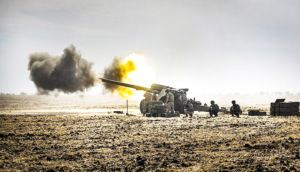Opinion
Guest opinion: Genocide as liberation
Luka Perehinets
This article is more than 3 years old.

Expert concluded strikes made no “military sense” (photo: Ministry of Defence of Ukraine)
Russian President Vladimir Putin has often demonstrated the clarity of his goals during the War in Ukraine. As has happened with every instance of celebration in Ukraine, moments of peace don’t last very long and on October 10 that became more than evident.
After what felt like a personal victory for every Ukrainian with the bridge connecting Crimea to Russia suffering severe damage, the hopes of a turning point were shattered as major cities and infrastructure became a target of mass destruction when 83 missiles were fired at them by the Russian Federation.
Broken link
On Saturday morning, a massive explosion set the Kerch Bridge in Crimea ablaze, striking the key supply route for Kremlin’s forces in Ukraine’s south, striking a massive blow to what was of great symbolic importance for the Russian leader. The bridge had represented the permanent occupation of Crimea and the possibility of a future reunion, which Putin decided to make an official attempt at on February 24 this year.
It was an ideal demonstration of the ways in which Russia wanted to “develop” the newly annexed territory and brand it as its own. While the UN General Assembly condemned the bridge’s construction in 2015, it served a very clear purpose of militarisation, rather than “unity”.
But Kyiv sought to destroy the narrative that the two were “united”, with the Ukrainian defence ministry claiming it had anticipated Monday’s attacks as they “were planned by the Russians since the beginning of October”. Such strikes directly targeted children’s playgrounds, civilian parks and valuable infrastructure all over Ukraine – specifically in Kyiv.
Blood retaliation
With over 100 wounded people, and 11 reportedly dead in the morning rush hour, 14 regions in Ukraine experienced the treachery of Russian missiles falling from the sky. While Russia to no one’s surprise claimed it had targeted military and energy facilities, many of the missiles struck civilian areas. A massive strike targeted a playground in downtown Kyiv and another Taras Shevchenko National University.
With thousands left without electricity and water heading into Monday night, Andriy Yermak, a senior advisor to President Volodymyr Zelenski, said the strikes had no “military sense” and that is was simply to terrorise the Ukrainian public even more.
However, in what is becoming a trademark of Putin, the weapons were supposedly meant to target military facilities as they were “percision weapons” and payback for what he branded as terrorist actions in referance to the partial destruction of the Crimean bridge.
A turning point
Yet, while the Kremlin’s war in Ukraine is approaching the eight-month mark, Russian forces have sustained humiliating battlefield setbacks in eastern Ukraine, and despite the great atrocities of Monday morning, the Ukrainian people’s hope for victory hasn’t waivered.
Following the bombings, people sheltering on the stairs of the Kyiv subway station sang a Ukrainin folk song, ‘In a Cherry Garden’, proclaiming the words: “My dear mother, you are old and I’m happy and young. I want to live, to love.”
Some 230 days and counting, the war continues.

About
Luka Perehinets
Luka is an 18-year old Ukrainian student living in Copenhagen who studies at the Copenhagen International School in pursuit of a degree in neuroscience. Over the last 18 years, he’s lived in four different countries: the United States, Russia, Ukraine and Denmark. In 2017 his family moved from Kyiv to Copenhagen due to his father’s employment at the World Health Organization. Luka has a younger brother and an older sister, who studies history and politics at the University of Edinburgh. In his free time, he enjoys spending time with his family and engaging in an in-depth analysis of scientific journals regarding the nervous system as well as a variety of sports. With a rich knowledge of Ukrainian history, Luka has been able to analyse the current events in Ukraine from a wider perspective.










































